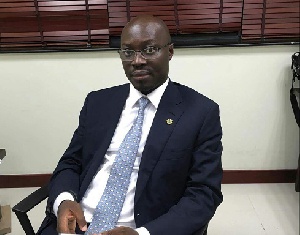- Home - News
- TWI News | TV
- Polls
- Year In Review
- News Archive
- Crime & Punishment
- Politics
- Regional
- Editorial
- Health
- Ghanaians Abroad
- Tabloid
- Africa
- Religion
- Election 2020
- Coronavirus
- News Videos | TV
- Photo Archives
- News Headlines
- Press Release
Opinions of Sunday, 9 April 2017
Columnist: Ato Forson
Eyes are watching IMF
I understand the IMF is in town to review Ghana's 3-year Extended Credit Facility (ECF) Program.
The international community and the financial markets are likely to closely monitor the outcome of the Program review.
Going forward, they will be keen to know whether the IMF will with Ghana revise the program to enable the government fund its campaign promises without any regards to the stability and strength of the economy.
It will be recalled that this was the stance espoused by the Senior Minister during his vetting but bearing in mind that the same IMF declined to give the previous administration the needed fiscal space to fix the energy challenges of the country. It also refused to give the NDC administration the required fiscal space for additional extraordinary expenditure for the conduct of the 2016 elections.
All this mean watching the IMF to allow the current government to implement the program substantively, as originally structured by the previous administration with the aim of achieving macro economic stability.
The critical assurance that market watchers are keen to note is whether the IMF will insist on certain prior actions and criteria. It will be recalled that the IMF Ghana Team insisted that the then NDC administration implements these measures before even taking the Program to IMF Board of Directors for approval. Will they be intact or these will be removed, as the budget already seem to suggest? Infact, there were similar pressures during the past 3 reviews, that many had insisted were drastic by even a dogmatic IMF standard.
Already, market watchers are concerned that prior actions such as;
1. the special petroleum tax have been reduced from 17.5% to 15%.
2. The 1% component on the special import levy, which the IMF had insisted must be justified as prior action before review, has been abolished (The 2% however remains)
3. Excise duty on petroleum products has been abolished and the flat rate of 3% has been reintroduced to cover retailers and, quite strangely, wholesalers. A Previous IMF expert's viewpoint that became a prior Action and international best practices is that this will weaken the VAT mechanism, erode its base, undermine compliance and breed corruption.
In essence, the critical point for market watchers is whether the IMF is already treating this government with kids gloves, as compared to the previous government.











